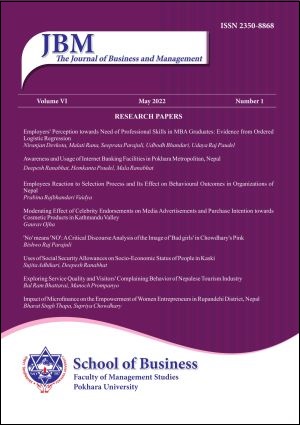Employers' Perception towards Need of Profession Skills in MBA Graduates: Evidence from Ordered Logistic Regression
DOI:
https://doi.org/10.3126/jbm.v6i01.46628Keywords:
Hard skills, order logistic model, perception, professional skillsAbstract
Background: Globally thousands of MBAs graduates annually who opt for employment opportunity in the market. It creates strong competitive job market for new MBAs. In past, the only qualifications required for jobs is technical skills, also known as hard skills; but today’s hiring process indicates only technological skills do not provide adequate opportunities fresh MBA graduates.
Objectives: This study aims to analyze employers’ perception on need of professional skills in MBA in Kathmandu valley.
Methods: The study adopted explanatory research design. Purposive sampling technique was used to select 280 employers from bank and financial institutions as a respondent. Structured Questionnaire was used and data collection was done with the KoBo-Toolbox. In order to analyze data, Ordered Logit Model was used to identify the perception of employers’ towards need of professional skills in MBA graduates in Kathmandu valley.
Results: Findings revealed that employers seek soft and hard skills in MBA graduates. Further, Ordered Logistic Result indicates that age, education level, recommendation, adaptability skills, learning skills, conflict resolution skills and teamwork skills are the major skills statistically significant. It clearly indicates that in employers’ perception soft skills have high importance than hard skills as need of professional skills in MBA graduates.
Conclusion: Following employers’ perspectives, MBA colleges should priorities to provide professional skills, more focusing soft skills, to their graduate. Such skills not only help MBA students to understanding their market, but also produce readymade manpower to the job market, that reduce training and other preparatory cost of the organizations.
Downloads
Downloads
Published
How to Cite
Issue
Section
License
Copyright © the School of Business. All rights reserved. No part of this volume may be reproduced or utilized in any form or by any means, electronic or mechanical, including photocopying, recording, or by and information storage and retrieval system, without permission in writing from the publisher.




